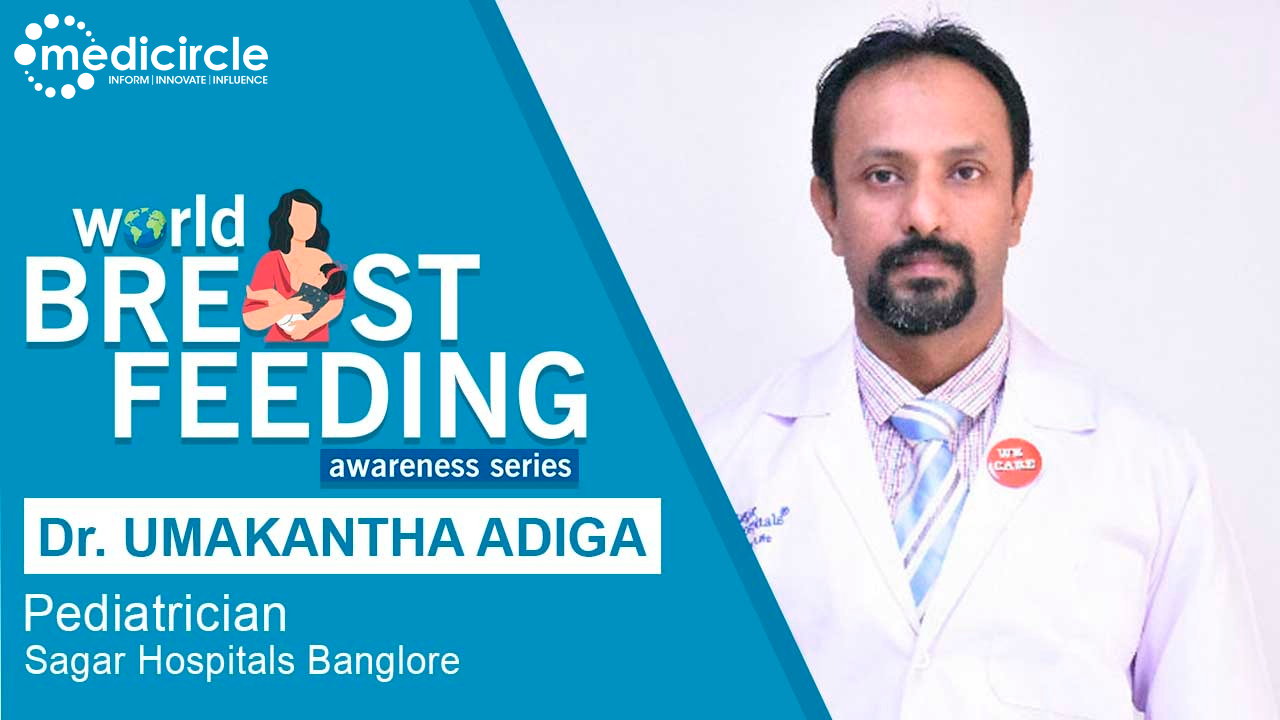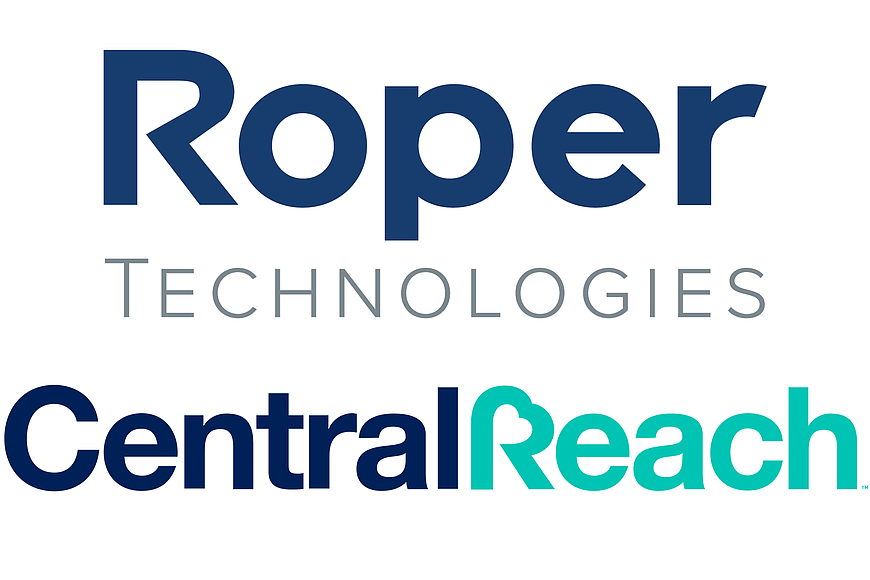World Breast Week (WBW) is celebrated every 1st -7th August in commemoration of the 1990 Innocenti Declaration. WBW started in the year 1992, with annual themes including healthcare systems, women and work, etc. It is a global campaign to raise awareness and galvanize action on themes related to breastfeeding. The body can develop in a better way when Qualitative and better Milk is given to the Babies. One has to do many of the activities to achieve their goals in the future. To make the Baby more sharp, intelligent, and strong enough to tackle and handle all the activities properly, every mother has to develop their mind to focus and concentrate on giving every small child mother’s milk. Medicircle is conducting a series on this occasion to spread awareness about the virtues of breastfeeding for both the mother and the child by speaking to experts.
Dr. Umakantha Adiga is a Pediatrician in Bangalore and has experience of 21 years of in this field. Dr. Umakantha practices at Sagar Hospitals in Banashankari, Bangalore, Greenview Medical Centre, and Sagar Hospital DSI, Bangalore. He is a member of the Indian Academy of Paediatrics (IAP). Some of the services provided by the doctor are Growth & Development Evaluation / Management and Vaccination/ Immunization.
Breastfeed – How long
Dr. Umakantha says, “As such, there is no upper limit. But we advise the mothers to exclusively breastfeed at least until the age of six months. And beyond six months, she can continue breastfeeding even up to two years or even beyond if she's happy with it. But at least six months is exclusive breastfeeding. And we strongly advise feeding for at least two years that could be in addition to the other diets which can supplement the baby's growth.”
Breast engorgement
Dr. Umakantha speaks, “Initial visit to a gynecologist is a must. A gynecologist can examine her breasts and anticipates what all problems can happen? There can be the problem of the decreased nipple or retracted nipple, those things can be corrected from the pregnancy time. And once the baby is born, it's very important to initiate breastfeeding within half an hour. In the case of the C- Section, we advise them to start within one hour. And she also needs good support - sisters, lactation consultants which will help in establishing breastfeeding. Nowadays most mothers are having only one child, so they don’t have any pre-experience. It's something new and they always have the fear that lactation may fail.”
Dr. Umakantha adds, “It would be surprising if I tell you the baby's stomach size is just a small marble. So even a few drops of milk which we call colostrum is very important for the baby. We encourage them to feed as early as possible and as regularly in the initial few days. Once the feeding gets established baby latches on to the breast and the mother develops the confidence of feeding the baby. This way the other problems are dramatically reduced including the problem of breast engorgement. This breast engorgement happens when the cycle of feeding is not well established. Some of the reasons are –
Suppose there is not enough support to the mother to initiate the breastfeeding so the baby may not also take the feed well.
Sometimes when lactation fails and resorts to other methods like giving other formula feeds, then the baby gets used to other feeds like bottle feeding.
Confusion between the nipple and the mother's nipple is called nipple confusion, the baby may not feed well at the breast.
In the early stages, we can always intervene. To reduce the pain, we can give some medicines like paracetamol and some hot fermentation like if there is any pain elsewhere, we can give a hot water bag. And with the help of some trained nurses, we can also express the milk. This would reduce the initial engorgement.
Once the breast becomes softer and pain reduces, we put the baby to the breast and teach the mother the correct technique of feeding. Once the correct technique of feeding is established, the problem of engorgement shouldn't happen. If not treated early, it may also stop the flow of the milk in the future days. And can lead to other complications like the formation of some pus in the breast and various other things. So, a simple problem dealt with early can be corrected easily.
Breastfeeding Latching steps
Dr. Umakantha explains, “Actually, the pain in the nipple shouldn't happen if the baby's feeding properly. We call that in a semi-technical term, latching.
"A baby who is feeding well will open its mouth completely. And will hold a nipple and the areola also. So, if the whole thing is inside the mouth, then it doesn't bite. If a mother doesn't know the technique or she hasn't been taught that technique, what the baby does is just holds the nipple and start biting. Even though the baby doesn't have a tooth, but the baby has got gums that are quite strong enough. When the baby repeatedly bites, it can cause fissures cracks, sometimes bleeding. Nipple becomes sore. And next time if the mother doesn't correct the technique, she feels the pains every time she tries to feed. So again, we intervene here, try and teach them the correct technique of latching. And if there is too much pain, we ask her to rest that side for about a few hours, maybe three or four hours. And the medicine to be applied is very simple, she can apply just her milk around the nipple, and that has got healing properties. It will heal any small wounds or anything which is around the nipple and reduces the pain. But we cannot allow her to rest the particular site for a longer time, because there is a chance that the engorgement can happen and that can lead to problems. So main emphasis is on teaching the proper technique of latching for the baby.”
Milk production
Dr. Umakantha voices, “We never usually take out the milk and check whether milk is there or how much milk is there? The mother feeds a baby for about 15-20 minutes, then the baby takes a rest for about two or three years and goes to sleep. But usually, that much time is sufficient. But some babies particularly during their initial days as babies still learning to breastfeed. So, in the first one week, what they do is they feed for five minutes, go to sleep. Either way, it will get whatever milk is necessary for it. Hence, the mother need not worry about the feeding of the breast. But once the baby becomes more efficient in feeding, then the cycle gets established and the baby feeds often once in 2-3 hours. And that much time is usually sufficient for filling of the breast.”
“Nutrition is an important thing. She has to spend a lot of calories on producing enough milk. But as a pediatrician, we advise them to eat fruits, vegetables. She has to drink plenty of water because she has to produce around 1000 ml of milk every day. She can drink milk, rice, khichdi. She should continue having a well-balanced nutritious right diet. She only has to avoid junk food. Because junk foods are not so nutritious. So that's the only bar we put for the mothers.”
Dr. Umakantha advises, “We advise them to take as much as possible a normal diet, including the spices because all these are reflected in the contents of the milk. So, the baby which are already been exposed to these types of normal food will eat better in the future.”
Breastfeeding while COVID19
Dr. Umakantha` clarifies, “It is very safe to continue breastfeeding, even if it is proven COVID positive. The only precautions mother has to take
Wear the double mask or surgical mask.
Follow proper hand hygiene. She has to wash her hands with soap and water or sterilize before handling the baby.
After feeding the baby, she can ask some other attendees to keep the baby in another room in a separate cradle. This is because, by the time mother comes to know she is positive, she would have already had symptoms, and she would have been in touch with the baby for a long time. So, there are chances that babies already caught the infection. Once you take the baby away, you are denying the precious antibodies present in the milk. The baby is getting immunized by doing breastfeed passively. There is no need to wash your breast or nipple every time. You just need to wash your hands.”
(Edited by Renu Gupta)

 Dr. Umakantha Adiga sheds light on some important problems and facts during the lactation period. He also explains that breastfeeding is safe even with COVID-positive mothers. They just need to follow proper protocols for lactating the babies.
Dr. Umakantha Adiga sheds light on some important problems and facts during the lactation period. He also explains that breastfeeding is safe even with COVID-positive mothers. They just need to follow proper protocols for lactating the babies.






.jpeg)



.jpg)








.jpeg)





.jpg)




.png)



